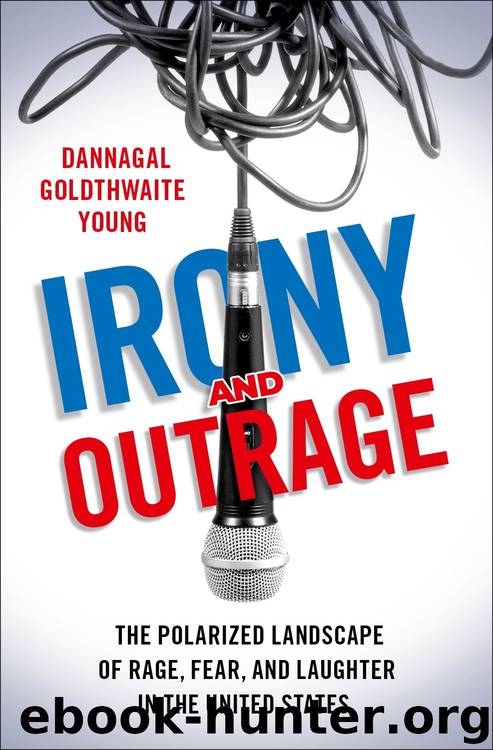Irony and Outrage by Dannagal Goldthwaite Young

Author:Dannagal Goldthwaite Young
Language: eng
Format: epub
ISBN: 9780190913106
Publisher: Oxford University Press
Published: 2019-07-31T16:00:00+00:00
Both jokes make the argument that taking a selfie with a bear is a dumb thing to do. It’s unsafe, and the people who do it are unwise. However, the first one makes the argument in a Colbertesque ironic persona—requiring that the audience recognize the ironic intent of the speaker. The speaker feigns outrage that the Forest Service is prohibiting him from taking a selfie with a bear. Once he acknowledges that he would want to livestream his own death, it cues the listener to realize that this statement is in jest. The second uses hyperbole to suggest that (1) very few people would want to do this, and (2) those who would are not smart—not even smart enough to read.
After pretesting the jokes using a group of trained coders who rated how “ironic” and “exaggerated” they found the jokes, we were left with eight pairs of jokes to test. We obtained a national sample of 305 participants through Qualtrics, a national survey company that recruits study participants with consumer rewards like gift cards and coupons. We specified that we needed a sample with 45 percent self-reporting a conservative ideology and 45 percent a liberal ideology (and 10 percent moderates). The participants watched the eight short joke videos, each of which was randomized to show each participant either the ironic or exaggerated version. If our baseline assumptions were correct, we would find that the conservative participants were lower in tolerance for ambiguity and in need for cognition than liberals. If our hypotheses were correct, we would find that conservative participants appreciated the ironic jokes less than liberals and that this relationship was explained in part (statistically speaking) by the lower tolerance for ambiguity and need for cognition among the conservative respondents. We also believed that the converse would be true of the exaggerated jokes; that conservatives would appreciate them more than liberals, and this result would again be explained by lower tolerance for ambiguity and need for cognition.
After analyzing the data with my colleague Ben Bagozzi, I learned that we were half right (or half wrong, depending on your mood—and ideology). The conservatives in our study were indeed significantly lower in tolerance for ambiguity and need for cognition than the liberals; and the conservatives were significantly less appreciative of irony than the liberals. But the conservatives were also less appreciative of the exaggerated jokes than the liberals.
The mechanism we hypothesized wasn’t quite right either. Conservatives’ lower need for cognition helped account for some of their lower humor appreciation, but tolerance for ambiguity was not a significant factor. Unfortunately, the measure of tolerance for ambiguity we used didn’t have great statistical reliability, so we may have underestimated the role of that construct. Yet one additional finding was important. In addition to measuring how funny participants found the specific jokes they watched, we also measured the general psychological trait “sense of humor” using a nine-item scale adapted from the work of James Thorson and F. C. Powell.29
What we found was that conservatism was a strong and significant negative predictor of the general trait “sense of humor.
Download
This site does not store any files on its server. We only index and link to content provided by other sites. Please contact the content providers to delete copyright contents if any and email us, we'll remove relevant links or contents immediately.
| Anarchism | Communism & Socialism |
| Conservatism & Liberalism | Democracy |
| Fascism | Libertarianism |
| Nationalism | Radicalism |
| Utopian |
The Secret History by Donna Tartt(19041)
The Social Justice Warrior Handbook by Lisa De Pasquale(12185)
Thirteen Reasons Why by Jay Asher(8887)
This Is How You Lose Her by Junot Diaz(6874)
Weapons of Math Destruction by Cathy O'Neil(6263)
Zero to One by Peter Thiel(5786)
Beartown by Fredrik Backman(5737)
The Myth of the Strong Leader by Archie Brown(5496)
The Fire Next Time by James Baldwin(5429)
How Democracies Die by Steven Levitsky & Daniel Ziblatt(5211)
Promise Me, Dad by Joe Biden(5141)
Stone's Rules by Roger Stone(5080)
A Higher Loyalty: Truth, Lies, and Leadership by James Comey(4948)
100 Deadly Skills by Clint Emerson(4917)
Rise and Kill First by Ronen Bergman(4777)
Secrecy World by Jake Bernstein(4739)
The David Icke Guide to the Global Conspiracy (and how to end it) by David Icke(4699)
The Farm by Tom Rob Smith(4502)
The Doomsday Machine by Daniel Ellsberg(4484)
